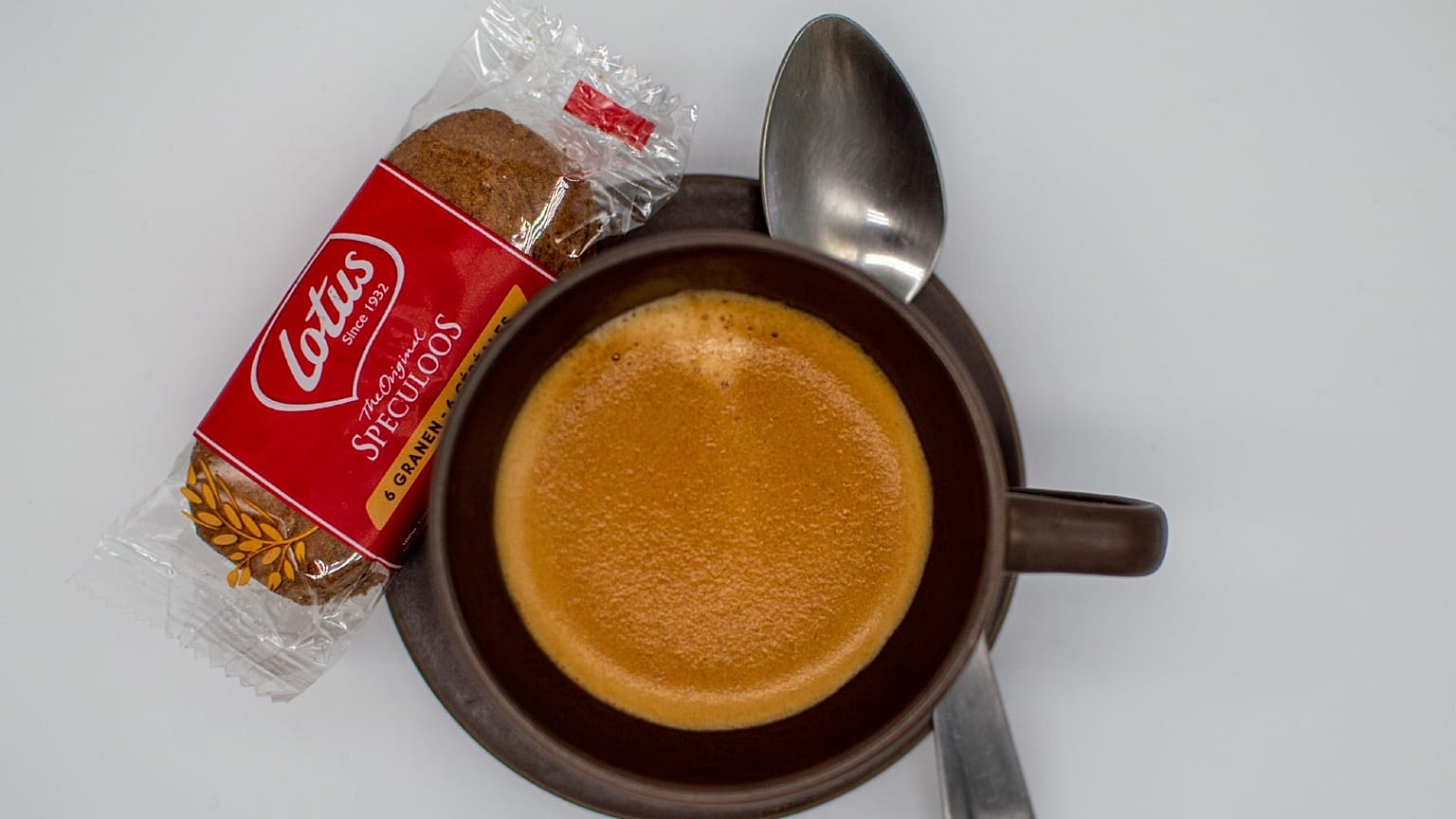When the CEO of Lotus Bakeries recently announced plans to axe the speculoos — Belgium's national biscuit — name from branding on its biscuit packs, there were howls of discontent on social media and angry calls for a boycott.
In a country that is as divided as Belgium, unity is a precious commodity.
Split between the French-speaking south, Brussels and the Flemish north, it took Belgium 16 months to form its last government.
Set against this backdrop, it is difficult to imagine an issue important enough to bring Belgians together.
Except, of course, biscuits.
When the CEO of Lotus Bakeries recently announced plans to axe the speculoos — Belgium's national biscuit — name from branding on its biscuit packs, there were howls of discontent on social media and angry calls for a boycott.
Loved by Belgians everywhere the little biscuits are a staple and served next to a coffee in every café and bar in the country.
The ginger and cinnamon-spiced biscuit has indefinite origins but its current incarnation dates back to Hasselt in Belgium circa 1870. Lotus began manufacturing its own version of the biscuit in 1932 with the establishment of its factory in Lembeke, East Flanders, and the family business quickly became the nation’s most popular brand of speculoos.
But while it’s been known as speculoos in Belgium since its invention, when Lotus took the brand to international markets in the 1990s, it abandoned its native name.
Instead, it gave it the name Biscoff — a portmanteau of “biscuit” and “coffee” — easier to say for an international audience.
Belgians protest as #jesuisspeculoos trends on Twitter
Now Belgians are revolting, with some saying they will never accept the new “American” Biscoff title. The news caused a minor media storm, with Facebook awash with calls to boycott Lotus and #jesuisspeculoos trending on Twitter.
The name-change has proven hard to swallow for Belgians, and Lotus CEO Jan Boone was demonised as a veritable Cookie Monster for changing the name. Amid domestic biscuit woes and a week of controversy, Boone declined to be interviewed. However, he has already declared his reasons for the change in Belgian newspaper De Tijd.
Protecting the brand from imitations was one motive another was ambition.
“The dream is to turn Biscoff into a global brand, one of the biggest brands in the world," he said. "If the biscuit is called Biscoff all over the world, we make that statement.”
So will the new Biscoff biscuit survive the re-brand? Hot on the heels of “Emily in Paris”, is this another transatlantic cultural divide in the making? And why does the name speculoos mean so much?
Marketing strategist Julie Haspeslagh has worked with many local Belgian and global brands. She explains the attachment the Belgians have to the name.
“Speculoos is one of those things for Belgians that’s like beer and fries, it’s part of our food culture. It comes with a coffee. It’s known for the little single packaging size, one biscuit next to your cup.
In a country divided by language, the speculoos seems to be one thing that both Walloons and Flemish have in common and maybe an insight into the national outrage.
“Our food culture is important in unifying Belgians,” added Haspeslagh. “And speculoos is part of it. We’re proud of it.
"Apart from food and the Red Devils football team, Belgium doesn’t really have a deeply rooted identity or culture that is shared by us all.
"We are a very young country, only in existence since 1830. And we are an artificially made country. So I guess when we do have something like speculoos, we can react emotionally to it.”
Has the 'country of compromise' found a solution?
However, there is a compromise in sight.
In Belgium — and the Netherlands and France, which also use the name — the words “The Original Speculoos” will be added below the new Biscoff logo on the packaging.
"The last thing we want to do is deny our roots," said Boone to De Tijd. He is a third-generation director of the family-run company.
Haspeslagh agrees that removing speculoos completely from the pack would be risky.
“People still want to be reassured that it’s speculoos. It will be key on any new packaging that even if Biscoff is on it, people are reassured the product is still the same taste, same speculoos.”
As a product, renaming speculoos is like renaming bread, or cake. It is in essence a generic name – anyone can make their own speculoos if they have the skills. Haspeslagh explains the confusion between brand and product in the speculoos affair.
“Here, speculoos is technically not a brand, it’s a product category," she said. "That’s also one of the key reasons why I think Lotus is introducing 'Biscoff' because a product name like speculoos cannot be patented.
“It would be very risky to invest in a brand in which you don’t have the full rights. And on which you are not protected. That’s what makes this so different because it can be debated - is it a brand or a product name?”
The marketing expert emphasises the company’s need to hold its own on a global scale.
“Lotus is a Belgian food company that has to compete with large multinationals and big international biscuit brands. So at a certain point, they need to take some measured risks to stay ahead in the game.
“It’s a difficult line, when managing brands, between a locally-grown brand jewel and international brands,” she said. “Lotus will have done its thorough research and weighed the pros and cons, but it’s only when the pack hits the shelf that we’ll see how consumers react. The proof of the pudding is in its eating, no?”
Brecht Tessier is a bartender at Café Bizon, a well-known bar in Brussels. He has no doubt perfected the routine of placing a single speculoos on a saucer beside his customers’ coffees.
“This speculoos is our “thing”, what we got from our grandmother, and we played the game of dipping it in the hot chocolate or coffee and eating it before it fell in the cup,” he said.
“It's one of the few things we are all proud of as Belgians and that we claim as ours, like beer, chocolate or comics.”
“We consider it as our informal heritage,” continued the bartender. “So it feels a bit like it's being sold out to serve a foreign public.”
Ever the diplomatic Belgian, he is pragmatic in the end.
“But what’s in a name? I'm sure the taste of this delicious Belgian cookie will be what's remembered,” he says.
'It's like globalisation is getting into our homes when we have a coffee'
Hugo Poliart, Belgian writer and cultural commentator, echoes its popularity.
“Speculoos is something that everybody knows, it’s sweet and it’s part of our eating culture and gastronomy, which is very important in Belgium. It’s one of those typical Belgian products that we all know from generation to generation”.
Poliart is partial to a speculoos from time to time. “I like when a good speculoos is coming with my coffee, which is the Lotus one. I buy that brand because the pack is very famous and I know that the brand is good and is the original one”.
He is nonplussed about the online idea of a boycott of the company.
“It’s a kind of a process, people want to be involved and give their opinion but, after a while, they get used to anything," said Poliart.
"And I think now that the decision that they took about adding a mention of 'speculoos original' is a kind of compromise.”
Could the Biscoff debacle be seen as a global influence invading a local product?
“The globalisation aspect I think might be important in people’s mind nowadays because they are fearing a bit the standardisation at a global level of everything, of cultures," he said. "And they’re taking the speculoos, which is something that we eat every day, so it’s like globalisation is getting into our house when you have a coffee at home.
“And it’s a taste, so it’s our senses that it has touched. It’s something very deeply linked to our life. There’s also the aspect of history and generations and childhood remembering. It’s like the madeleine cake in the book of Marcel Proust, À la recherche du temps perdu (In Search of Lost Time). It’s something that is really deep, this little thing. Speculoos has a lot of meaning in the Belgian population’s minds and memories.”
Even if Belgians keep using the old moniker despite its new name, Haspeslagh has no doubts as to the continued success of the brand.
“As long as they keep speculoos somewhere on the pack, Belgians will adapt as they always do. We are, after all, a country of compromise.”
That is something else Belgians can unify around.
Every weekday at 1900 CET, Uncovering Europe brings you a European story that goes beyond the headlines. Download the Euronews app to get an alert for this and other breaking news. It's available on Apple and Android devices.















